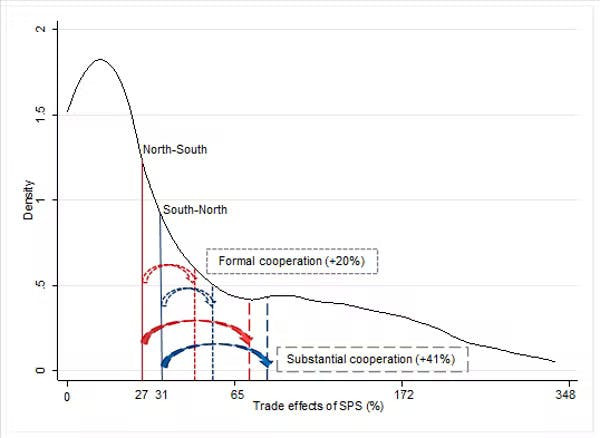How Trade Regulations May Be Opening Up a New Era of Sustainable Growth in the Global South Emilia Lamonaca & Fabio Gaetano Santeramo

You may or may not have noticed from the headlines of the past years: that in our interconnected world, the food systems are increasingly under pressure.
Cross-border trade has brought prosperity to households and food diversity to our kitchens, but also an increased risk of transporting pests and pathogens. Illegal trade in live animals, which accounts for $8-10 billion annually, exacerbates these hazards yet even more.
Climate change is another global challenge, unleashing heat waves, flooding, and hurricanes on our cultures. Moreover, warmer temperatures provide ideal breeding conditions for pests and pathogens attacking plants and livestock. The biblical Desert Locust plague that clouded over the Horn of Africa in 2020 was due to unusually high rainfall and flooding in areas usually spared by the insect. A year later, homeowners and farmers in the Northeast, Midwest, South, and Southwest United States watched in horror as an unprecedented fall armyworm invasion stripped down rice, soybean, alfalfa and other crop fields. The United Nations reckons some 40% of global crop production is currently lost to pests, while plant diseases cost the global economy more than $220 billion annually.
Amid these increased stresses, we are not equal. Rich countries such as the United States, Canada, Japan, and much of western Europe – the Global North – bear a large responsibility for climate change, having emitted 50% of all greenhouse gases since the Industrial Revolution. They have also developed better strategies to control the cross-border transport of pathogens, pests, and diseases through technology and production practices (e.g., the use of rootstocks to limit the spread of diseases on perennial crops; the genetic selection of resistant varieties).
Trade policies contribute to regulating safety issues
Several international institutions, such as the World Trade Organisation (WTO), are stressing the importance of the problem and the need to act and encourage the use of trade policies to support the climate agenda. Moreover, the International Monetary Fund (IMF), the Organisation for Economic Co-operation and Development (OECD), the World Bank (WB), and the WTO concur on the necessity to foster international cooperation as a unique strategy to face climate change issues. Indeed, and worrisome, we tend to observe the opposite.
Trade policies such as the sanitary and phytosanitary (SPS) measures are pervasive in the agri-food sector and are frequently used to regulate the trade of products vulnerable to pests and pathogens and exposed to disease outbreaks. They aim to protect human, animal, or plant life or health through safety standards. For instance, between the late nineties and early 2000s, the European Union implemented SPS measures to limit the presence of growth hormones in imported beef and of genetically modified organisms (GMOs) in imported food.
The Agreement on the application of SPS measures, negotiated during the Uruguay Round of the General Agreement on Tariffs and Trade (GATT) and entered into force in 1995 with the establishment of the WTO, defines the basic rules that governments are required to follow to provide safe food to consumers, avoid forms of protectionism of domestic producers, and prevent unnecessary obstacles to trade.
Safety standards favor the growth of the Global South
With the Global South accounting for the vast bulk of raw agricultural production (e.g., the value added of agriculture accounted for 17.2% of Gross Domestic Product of Sub-Saharan Africa in 2021), Fabio Gaetano Santeramo and I were curious to see how these regulations impacted national economies and global trade.
Our research brings largely positive news: countries that could afford to comply with these new safety standards benefited from increased economic growth and safer foods. Although vested interests may motivate the use of trade policies (and standards) to divert global welfare toward domestic firms, shifting the trade paradigm from a win-win scenario to a win-lose reality, the empirical evidence shows a different story.
Increased safety standards have led to upgrades in technologies and production practices, such as substitutions from chemical to organic fertilizers, thus to high-quality food. Safety standards have also contributed to the emergence of new origins and the expansion of existing trade routes to the benefit of the Global South’s market share and international relevance. The agricultural trade between the Global North and the Global South tends to be 30% larger with safety standards in place. The beneficial effects of safety standards are even more relevant if traders cooperate not only formally (e.g., employing a group of experts addressing safety issues) but also substantially (e.g., fixing technical rules to cooperate on safety issues).

Positive spillovers of SPS measures and cooperation – Effects on agricultural trade between the Global North and the Global South. Authors' elaboration
Is sustainable growth possible?
Contrary to claims by the degrowth movement, our research shows that trade regulations can make sustainable growth possible.
Sharing safety standards between differently developed economies would favor market access and avoid trade obstacles, lowering the developed-developing divide. Standard harmonization, for instance, in the context of trade agreements, is critical to achieving sustainable growth in a cooperative environment. The research shows that trade agreements reduce frictions in trade and lower the amount of time required to solve trade disputes. In short, trade agreements foster cooperation and growth.
Careful evaluations of the environmental impacts of trade agreements demonstrate that arrangements do not favor pollution havens but contribute to sustainable growth instead.
If the joint impact of climate change and international trade will favor the emergence and spread of pests and pathogens, efforts to monitor and manage their occurrence and control their cross-border transport will be crucial to face the challenges of global safety and sustainable growth. Trade policies could be a successful strategy, but their harmonization is pivotal, particularly with economies characterized by heterogeneous responsiveness to impacts of climate change and by different abilities to alter the terms of trade.
July 2022
Discover research projects related to the topic
Finance, Investment & Risk Management
Societal Challenges
Microfinance & Financial Inclusion
Emerging Market
Inequality & Poverty
Joint Research Initiative
China
2021.04.19
Understanding the Financial Lives of Low Income Households in China
Leveraging financial diaries research methodology, this joint initiative aims to provide actionable insights about the financial lives of low-income households... Read more

Xiugen
MO

